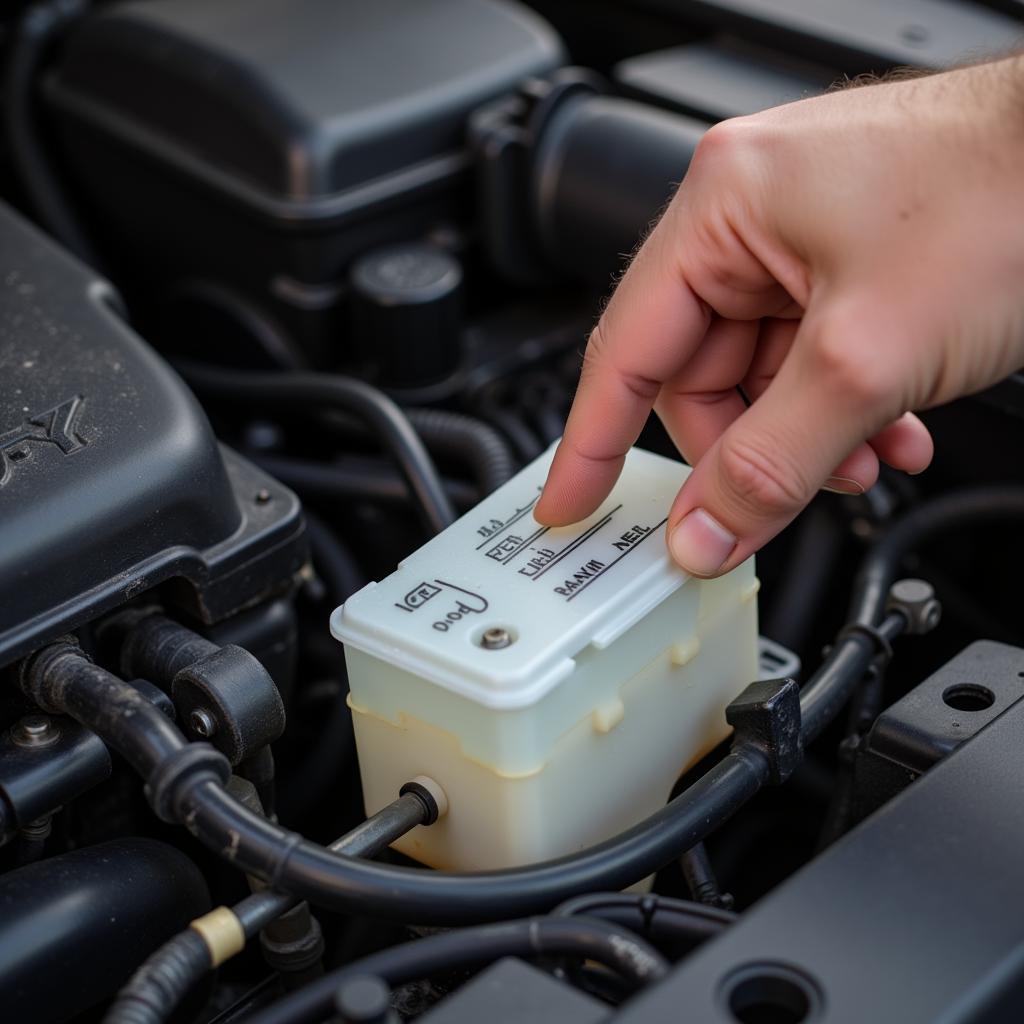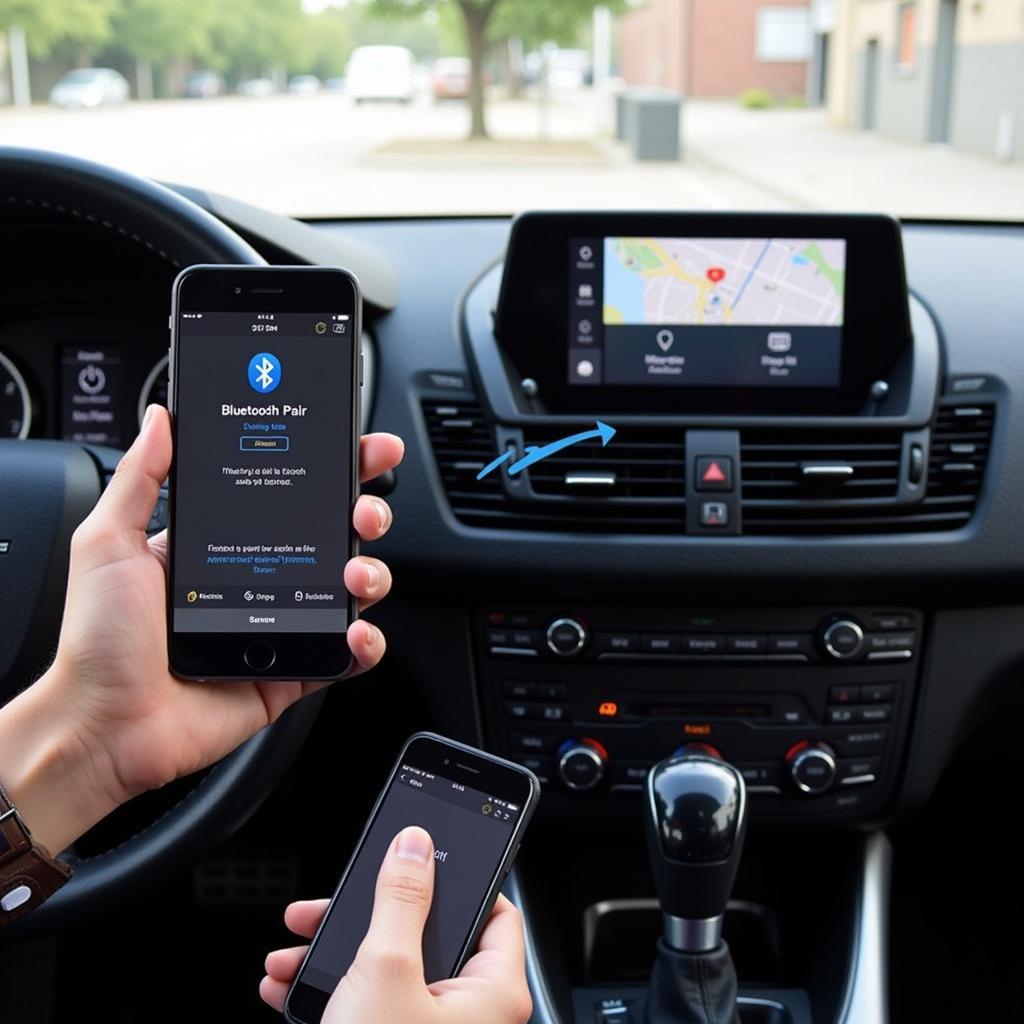If your Nissan Altima brake warning light stays on, it can be a cause for concern. This article dives deep into the reasons why your brake light might be illuminated, offering troubleshooting tips, and guiding you towards effective solutions. We’ll cover everything from simple checks to more complex diagnostic procedures, empowering you to address this issue confidently. See our article on bad battery in car symptoms if you suspect a connection with your vehicle’s electrical system.
Understanding Your Nissan Altima’s Brake Warning Light
The brake warning light is a crucial safety feature. It’s designed to alert you to potential problems within your braking system. When the nissan altima brake warning light stays on, it indicates that something requires attention, ranging from low brake fluid to more serious issues like a malfunctioning ABS system. Ignoring this light can lead to compromised braking performance and potentially dangerous driving situations.
Common Causes of a Persistent Brake Warning Light
Low Brake Fluid
One of the most common reasons for a persistent brake warning light is low brake fluid. This can be due to worn brake pads, a leak in the brake lines, or simply needing a top-up. Check your brake fluid reservoir and top it off if necessary. However, if the fluid level drops quickly again, you likely have a leak requiring professional attention.
Worn Brake Pads
Brake pads are designed to wear down over time. When they reach a certain point, a sensor triggers the brake warning light. Worn brake pads reduce your braking efficiency and should be replaced promptly.
Faulty Brake Sensor
Sometimes, the brake warning light can be triggered by a faulty sensor, even if the brake pads and fluid levels are fine. A diagnostic scan can pinpoint a faulty sensor.
Issues with the ABS System
The Anti-lock Braking System (ABS) is a safety feature that prevents wheel lockup during hard braking. If the nissan altima brake warning light stays on and is accompanied by the ABS light, there might be a problem with the ABS system, such as a faulty sensor or pump. This requires professional diagnostics.
Parking Brake Engaged
While seemingly obvious, a partially engaged parking brake can illuminate the brake warning light. Ensure your parking brake is fully released.
Troubleshooting Your Nissan Altima Brake Warning Light
- Check the parking brake: Make sure it’s completely disengaged.
- Inspect the brake fluid level: Top it off if low, but be mindful of rapid fluid loss, which signals a leak.
- Check your brake pads: Look for excessive wear. If they’re thin, replacement is likely needed. If you’ve recently had new brake pads installed and the light remains on, the sensor may have been damaged or improperly installed during the service.
 Checking Nissan Altima Brake Fluid
Checking Nissan Altima Brake Fluid
“A persistent brake warning light should never be ignored,” warns automotive expert, David Miller, ASE Certified Master Technician. “Even seemingly minor issues can escalate into major safety hazards if left unattended.”
Advanced Diagnostics and Solutions
If the basic checks don’t resolve the issue, you’ll likely need more advanced diagnostics, which can be performed by a qualified mechanic or using a diagnostic scanner. If you are dealing with a dead battery, check this article about jump starting a car not working. A scan can identify specific fault codes related to the ABS, brake sensors, or other components. Remember, if you’re unsure about anything, it’s always best to consult a professional.
Remote Diagnostic Services for Nissan Altima
Advancements in automotive technology now offer remote diagnostic and programming solutions. These services can often pinpoint the problem without requiring a physical visit to a mechanic. In some cases, software updates or recalibrations can be performed remotely, saving time and money. Read more on car battery dead overnight for helpful information.
“Remote diagnostics is revolutionizing car repair,” adds Sarah Chen, Automotive Electronics Engineer. “It allows for quicker diagnosis and, in many cases, remote repairs, offering a convenient and efficient solution for car owners.”
Conclusion
A persistent nissan altima brake warning light stays on signifies an underlying issue that shouldn’t be ignored. By understanding the potential causes and following the troubleshooting steps outlined above, you can address the problem effectively. Remember, when in doubt, consult a qualified professional for a thorough inspection and diagnosis. If you experience frequent battery drain, check out this resource on battery draining car problems. For scenarios where your battery might recharge itself, refer to this article: if your car battery is dead will it recharge itself. Addressing the brake warning light promptly ensures your safety and prevents potential damage to your Nissan Altima’s braking system.

